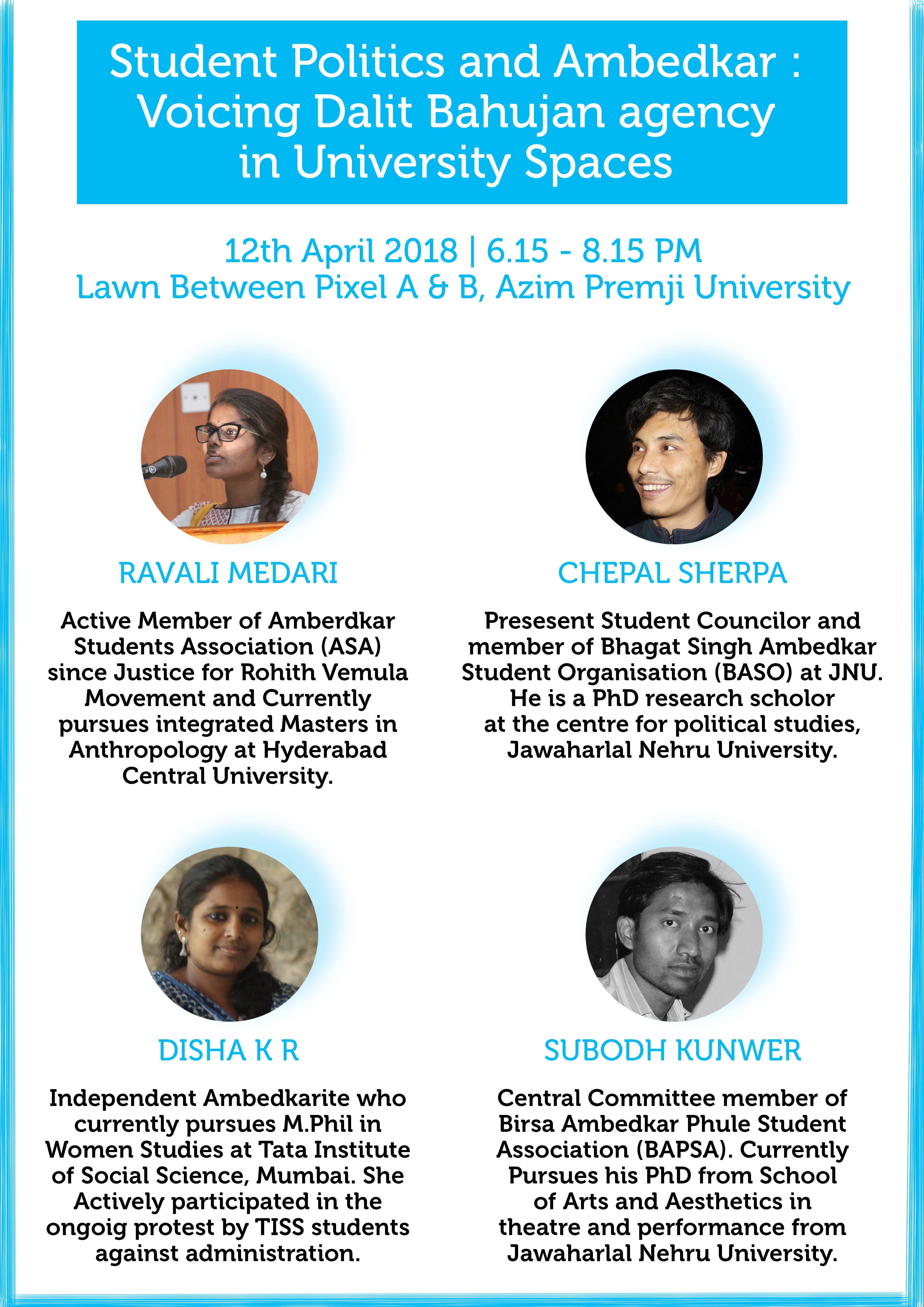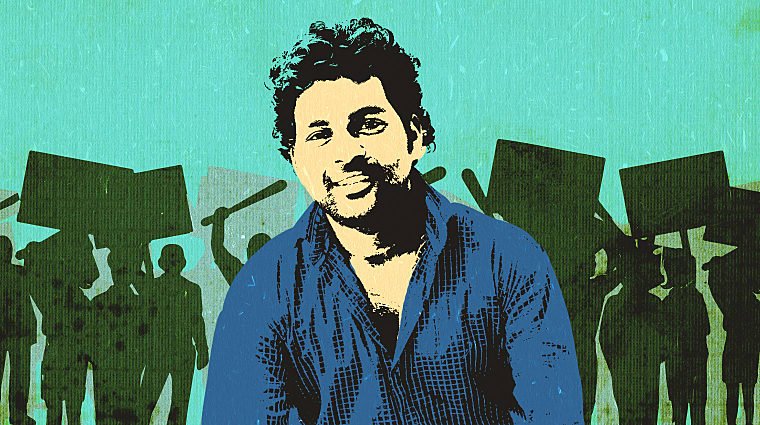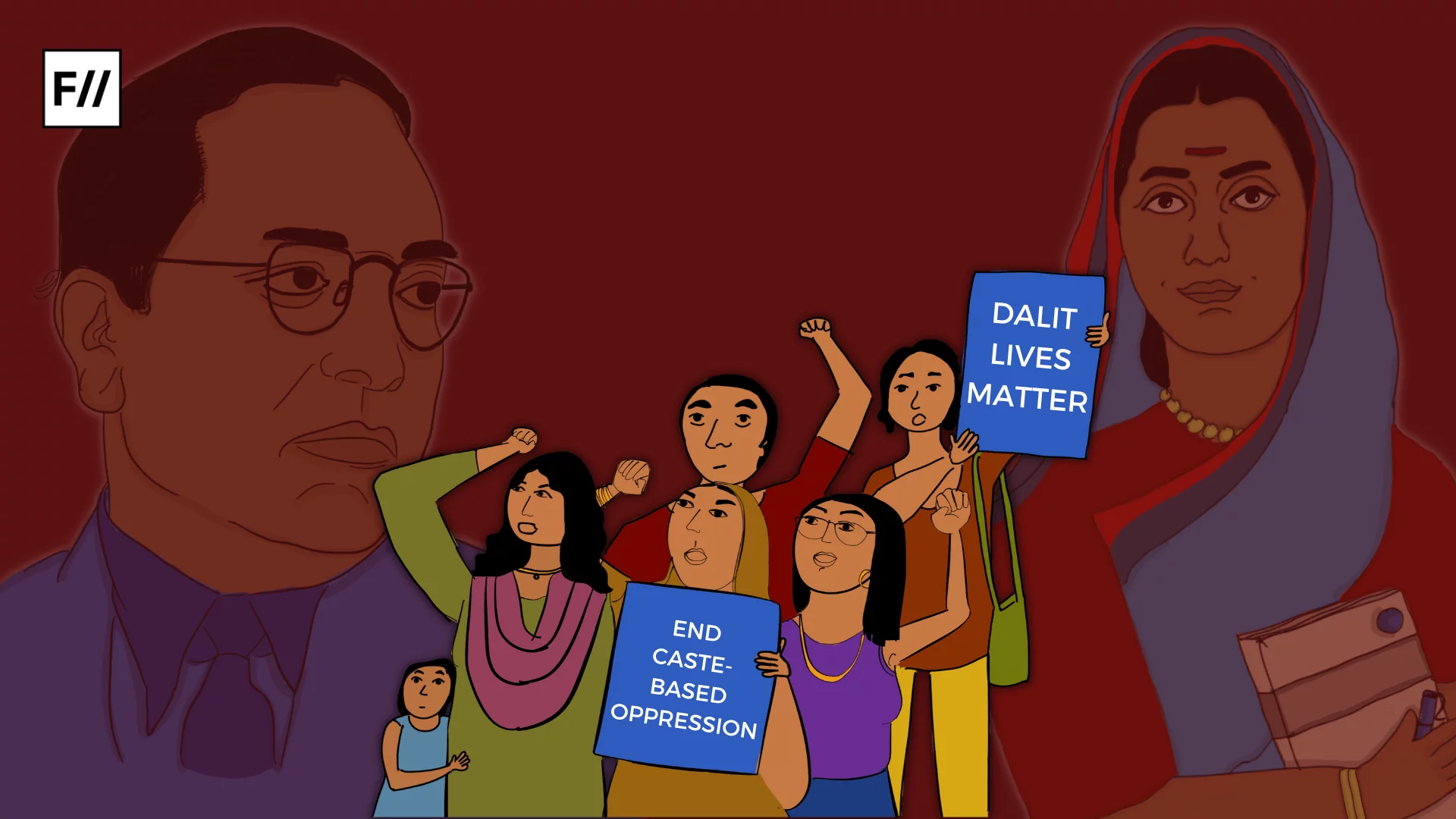Co-written with Anwar Salahudeen
“To study dissent is to study how the oppressed resist, challenge, and even undermine the hegemony and authority of the ruling elite and try to come into their own certain oppositional Politics” – MSS Pandian (The Image Trap).
Azim Premji University held its third Ambedkar Memorial Week between 9th to 13th of April. The theme for this year was ‘Voicing the Unspoken and Silenced Narratives on Ambedkar and subjugated experiences of subaltern subjects’.
The aim was to bring the lived experiences of marginalised people whose voices are invisibilized in the public realm. The aim was to push forward Ambedkar’s thoughts beyond the limited circle of narratives framed by mainstream Savarna academia and media.
The organizers said, “Ambedkar is a significant figure who took the herculean task of breaking established narratives (on socio-cultural structures like class, caste, sexual orientation, and gender) and created a self and voice for the unheard. But the mainstream academia and sociological discourse keep him bound to certain circles by side-lining his larger social contributions”. The week saw a plethora of conversations surrounding gender, identity, international relations, music and student politics keeping in mind Dr B.R. Ambedkar.
The organisers stated that, “A new wave of student politics in Indian universities is bringing the ideas of Ambedkar in its utmost strength against the venomous Hindutva politics happening across the country”. To hear about and understand this wave, a gathering of student voices from Hyderabad Central University, JNU and TISS were called upon to talk about their fight against Brahmanical educational institutes and for ensuring equitable academic and cultural spaces.
The student panel discussion was aimed at understanding and celebrating the voices of subaltern subjects and was called ‘Student Politics and Ambedkar: Voicing the Dalit Bahujan agency in University Spaces’. The panellists are associated with Dalit Bahujan student movements, fighting against the institutional discrimination in Indian universities.

The talk began with Ravali Medari, who has been a member of the Ambedkar Students’ Association (ASA) since the ‘Justice for Rohith Vemula’ movement. She discussed how the new government policies and restrictions placed on Dalit Bahujan students’ educational rights, and the attacks on educational institutes themselves have threatened Dalit students’ aspirations.
UGC’s roster point system, seat cuts, fee hikes, the PhD cancellations have all affected, not the Savarnas, but rather, the marginalized groups the most. She draws inspiration from Ambedkar’s own life and points out that the struggles that Dalit Bahujan students often face are reflective of the struggles that Dr Ambbedkar faced himself.
She said, “Dr Ambedkar fought against the system and went to study abroad, he had to come back half way because his funding got over. It is similar to what we are facing in terms of fund cuts now. This is probably why we always use the term ‘Dr’ before his name because it is a constant reminder of the struggles he undertook to ensure he got his Doctorate.” She went on to say that if Ambedkar had stopped fighting, then we wouldn’t have the rights we have today and thus we can’t stop fighting either.
Ravali’s powerful words were inspired from her own political struggle which started in Hyderabad Central University after the institutional murder of Rohith Vemula. As a person who has directly engaged in the ‘Justice for Rohith Vemula’ movement, she was not ready to talk about Ambedkar without uttering Rohith Vemula.
For hundreds of marginalised students from Dalit Bahujan communities, Rohith was their inspiration to practice Ambedkar’s revolutionary words – ‘Educate, Agitate and Organise’. The struggles of students from Dalit Bahujan communities started to be heard only after the institutional murder of Rohith.
Chepal Sherpa, who is part of Bhagat Singh Ambedkar Student Organization (BASO), took forward the conversation by talking about how Ambedkar’s ideology and Bhagat Singh’s ideology come together to help them struggle not only against Brahminical institutions but also the mainstream left. It was eye opening to hear how Ambedkar’s vision of the Annihilation of Caste to attain a democratic order was not up against Bhagat Singh’s idea of a Socialist revolution but actually went hand in hand with it.
Also Read: To The Bhadralok Academia, With Love
What was even more important was to understand how there is not one line of thought that alone strengthens student movements across the country, but the amalgamation of thoughts by different leaders from Ambedkar, Phule, Birsa, Muktabai Salve to Bhagat Singh. Chepal stated that, “Left politics without Ambedkar will never work in India, as Caste discrimination is central to the hegemonic power structure here”.
For the last fifty-five days, TISS students have been protesting against the administration and are fighting the institute’s decision to withdraw financial aid to students from Scheduled Castes, Scheduled Tribes and Other Backward Classes who are eligible for the central government’s post-matriculation scholarships. Disha KR, who is an independent Ambedkarite from TISS talked about how the institution that stands for social justice has disregarded this idea and limited it to its classrooms.
Disha said that, “They teach us caste, social justice but when we practice this, we are slapped with a legal notice. They expect us to be in servitude towards the institution for teaching us.” This is not the situation for only public universities but private ones like Azim Premji University, where students have been told to practice social justice outside the university and not within.
This rhetoric is used when marginalized students ask for their rights. Disha talked about the divisive tactics used by the university itself to turn students against each other, to break student solidarity. The support from faculty has been reduced as well. Their teaching of social justice seems to be limited to the students.
It was wonderful to hear that students don’t only take inspiration from Ambedkarite thought. They have also used personal solidarity to ensure that they continue the struggle against the oppressive administrative and state machinery that is insistent on following Hindutva policies which disadvantage marginalized populations.
In the same thread, Subodh Kunwer, who is a Central Committee member of the Birsa Ambedkar Phule Student Association (BAPSA), said that university spaces have always been a space that were republics, not for the Dalit Bahujan, but rather, republics ‘Of the Savarna people, by the Savarna people, and for the Savarna people’. The constant struggle for them has been to change this narrative.
The Indian state continues to reduce people to boxes and decides which box needs to be done away with.
He discussed how in pedagogy too when the marginalized are discussed, it is always written by the dominant caste. He said “We still ask questions like can the subaltern speak? Of course, the subaltern can speak whether you want to listen or not”. Along the same lines, he criticised the left student movements who do not listen to Dalit voices and label the Dalit Bahujan students as practitioners of ‘reverse casteism’. In Jawaharlal Nehru University, names of Dalit Bahujan leaders (Ambedkar, Birsa, Phule) were seldom visible on campus.
For them, Ambedkar, Birsa and Phule are not just ‘t-shirt figures’, but they are the inspiration and role models for fighting and creating their own cultural space in Indian academia by dismantling all the casteist hegemonic power structures. He was also optimistic in creating a larger horizontal solidarity between all the oppressed people in the student community to resist Hindutva forces in India.
The current climate of repression of students, their education, and their rights speaks volumes for the vile Hinudtva politics that is raging in universities. This is specifically targeted at Dalit Bahujan students and teachers, to ensure that the universities remain spaces of Savarna learning.
The Indian state continues to reduce people to boxes and decides which box needs to be done away with. Quoting Rohith Vemula, “The value of a man was reduced to his immediate identity and nearest possibility. To a vote. To a number. To a thing. Never was a man treated as a mind. As a glorious thing made up of star dust. In every field, in in studies, in streets, in politics, and in dying and living.”
The current wave of student politics, we believe, aims at ensuring that people and their minds are seen as glorious things made up of star dust. The people who wish to observe it from their privileged circles, often labelled it as mere ‘identity politics’, ‘dangerous’, and ‘communal’; but ultimately, it is the struggle for existence and liberation from the structures that have bound them.
We believe it is a fire that will not die, that Ambedkar’s life and thought will continue to make the state tremble like it has always done. That the state and its Savarna forces will tremble and fall in front of the strength and resolve of Ambedkarite student politics.
Also Read: Dear Bahujan Students, You Are Not Alone In This Agrahara
Anwar Salahudeen is currently pursuing his Masters in Education at Azim Premji University, Bangalore. His interests include decolonial studies, social exclusion, Dalit-Bahujan politics, the literature of the marginalised, politics of piety, sociology of education and liberation theology.
Featured Image Credit: Qrius
About the author(s)
I spend most of my time trying to smash the patriarchy, keep my privilege (of being a cis-upper middle-class woman) in check, and hoarding books. In my free time, I travel and work in the field of gender research and writing. I believe that equal rights, poetry, and pani puri can change the world.




